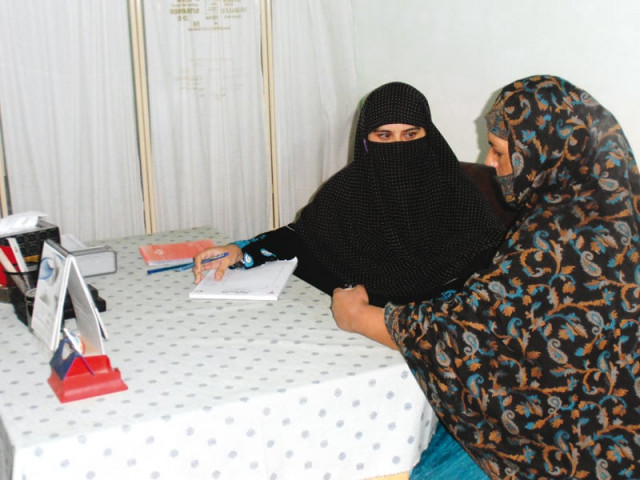Women at work: The daily grind to rehabilitate criminal minds
Sahira Bibi offers psychological assistance to jail inmates at Central Prison Haripur

Helping criminals get back on track is a difficult and dangerous undertaking. But Sahira Bibi, a psychologist in Haripur, has managed the task with great aplomb. Every day, she visits Central Prison Haripur and enables prisoners to rebuild their lives.
Sahira Bibi heads the Human Development Organization (HDO)’s Psychological Assessment and Rehabilitation Centre at the jail. Her job includes providing psychological assistance to inmates who have been victims of torture, violence or substance abuse. She treats 500 patients at the jail every year.
“I help inmates regain their mislaid confidence and self-esteem so they can face the world without relapsing into a life of crime,” she says.
In a man’s world
Sahira Bibi joined HDO, a non-governmental organisation, in 2012.In retrospect, she could not have imagined she would end up working for such a challenging and noble cause.

Born into a conservative family in October 1986, Sahira Bibi was taught that women did not have a place beyond the four walls of their house. Her family lived in Khalabat Township after they were displaced from their ancestral village when construction work began on Tarbela Dam in the early 1970s.
“I have three sisters and a brother and was the second child,” Sahira Bibi says.
Unfortunately for Bibi, her childhood years of fun and frolic were short-lived. Life took an unpredictable turn when her father passed away in 2002.
“I was in the tenth grade then,” Sahira Bibi says, trying to hold back her tears. “That day, my world was shattered into a million pieces.”
At the time, Sahira Bibi’s brother was too young to understand that he had to fill their father’s shoes. “My older sister was not allowed to step out of the house to even go shopping,” she explains.
Still young, Sahira Bibi assumed the role of the family’s matriarch. She would accompany her mother to the market and manage the accounts of the agricultural produce from the family’s lands. “I would even go to the bank and court,” she explains.
Forced by circumstances to cope with the hard realities of adult life, Sahira Bibi noticed a sea-change in her approach to life. At the age of 16, she had become independent, mature and confident. Unfortunately, her loved ones continued to try and impose restrictions on her.

After completing her intermediate education, Sahira Bibi made plans to study further.
“There were no girls colleges in Khalabat Township,” she recalls. “So I decided to read law at Girls Degree College in Haripur.”
Much to Sahira Bibi’s dismay, her family vehemently opposed this decision.
“No girl in our family had ever been allowed to study beyond Matric or intermediate,” she explains. “I cried for hours and pleaded with my mother, grandmother and uncles to let me go.” However, Sahira Bibi’s plea fell on deaf ears. Her family was not willing to go against tribal customs to accommodate her needs.
Initially, she was reluctant to go against her family’s wishes. Sahira Bibi even briefly thought about sacrificing her dreams at the altar of conventions.
“I learnt how to cook and helped my mother with the chores,” she adds.
With time, she felt short-changed by all the sacrifices and compromises her family expected her to make. The burning desire to continue her studies led Sahira Bibi to round two of the fight for education, this time armed with renewed strength.
“I stopped talking to my family and stopped eating for two days,” she said.
Sahira Bibi’s family was shocked by her willpower and defiance. They eventually relented and allowed her to study. However, her new-found freedom came with a condition. Bibi was instructed to observe purdah while she attended university.
The only girl from her tribe who had a chance to forge her own destiny, Sahira Bibi managed to break away from the conservative clutches of her family life. “Initially my mother accompanied me to the university,” she says. “With time, I started taking a school van to Haripur.”
Shifting gears
More often than not, a single incident can change the course of your life in an unpredictable manner. For Sahira Bibi, all it took was a visit to the court.
“I was shocked by the way women lawyers conducted themselves in court,” she recalls. “They seldom spoke and were made to feel conscious by their male colleagues who constantly stared at them and made snide remarks.”
According to Bibi, this unprofessional attitude towards working women raised a network of doubt in her mind. “My family was already reluctant to let me to go to university,” she explains. “They would have never been ok with me working among men who treat me like dirt.”
With that in mind, although she was keen on becoming a lawyer, Sahira Bibi chose to change her career path.
Her friend Hina, who was a gold medalist in psychology, encouraged her to become a psychologist. Since there were no universities in Haripur with a fully-functioning psychology department, Bibi decided to move to Abbottabad.
“I took admission at the Women Institution of Learning in Abbottabad to do my masters in psychology,” she says. “Fortunately, my family did not object to this decision as it wasn’t a co-educational institute.”
Turning point
After completing her postgraduate studies, Sahira Bibi gradually began to realise that the world really was her oyster. For the first time in her life, she felt a strong sense of achievement and wanted to challenge herself further.
“I was at the psychiatry department of the Combined Military Hospital Abbottabad as an intern for over a year,” she says. During this period, Sahira Bibi learnt a great deal from her brief stint at the hospital.
“I wanted to use my expertise for purely academic purposes,” she says, “However, I soon realised there was little scope for a psychologist to teach at a university.” Driven by pragmatism, Sahira Bibi shelved the idea of becoming an academic altogether and decided to work for an NGO instead.
“At first, my family was reluctant to let me join an NGO,” she explains, recalling their initial reservations and protective attitude. “They conducted a background check of the organisation. I think, in the end, they wanted me to do the job because I would be helping people who were suffering from psychological disorders.”
Now, after two years of a hard and inspiring struggle, her family and friends wholeheartedly respect and stand behind the choices she has made. Bibi is known as ‘Doctor’ by her near and dear ones.
Following in her footsteps, her two younger sisters now attend university. Moreover, a large number of girls from her family are now studying in Islamabad and Abbottabad.
Occupational hazards
Bibi’s job requires her to rub shoulders with hard-nosed criminals. However, this did not deter her from working hard and making a difference to their lives.
“It was difficult to work with jail inmates,” she explains. “Every prisoner had a similar gut-wrenching story to tell.”
At first, these tales would send a shiver down her spine and unsettle her. However, with time and experience, Sahira Bibi learnt to separate the grain from the chaff.
“Most of these narratives were fabricated to gain my sympathy,” she says. “I realised this later once I noticed the trend and detected loopholes in them.”
Nonetheless, Bibi derives great satisfaction from her work and perceives it to be a noble cause.
“It is quite different from working in a clinic,” she says. “More often than not, the treatment plan is revised as per the situation on ground.”
“Rehabilitation services for prisoners are good for the criminal justice system,” she explains. “It simultaneously reduces the rate of recidivism and financial burden shouldered by courts and jails.”
According to Sahira Bibi, suicidal ideation, depression and post-traumatic stress disorder are common symptoms among prisoners.
“There are multiple causes of these psychological disorders,” she says, “Most of them suffer degrading treatment at police stations and live under harsh conditions at the jail.”
Moreover, improper legal assistance, expensive court battles and the hostile attitude of their families have left them demoralised, Bibi adds. “I use relaxation therapy and skill development to help them climb out of their predicament,” she says.
Filled with reformist zeal, Bibi’s mission to change the lives of the jail inmates has borne fruit. Nearly 70% of the patients she has treated have shown signs of progress and recovery, she shares, not without pride.
Published in The Express Tribune, December 8th, 2014.













COMMENTS
Comments are moderated and generally will be posted if they are on-topic and not abusive.
For more information, please see our Comments FAQ